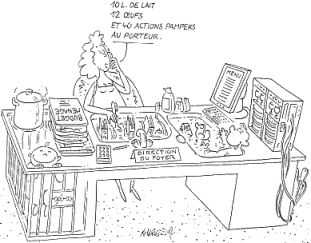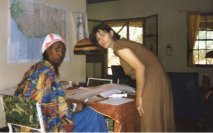Never I would have thought to become a teacher! And life taught me better!!!
In fact, I spent most of my life teaching and finally I am specialized.
professional positions
During and after my studies I worked (mostly as a teacher) helping me to get up my budget. Some little
jobs
were: offset printing, serving in a restaurant, teaching English to adults,
German to kids and filling in statistics.
|
2011 - now
|
Teaching and coaching in a school for children and young adults with a
hearing deficiency, on a one to one basis (from housekeeping through
nutrition advisor, up to a master degree in computer sciences).
|
|
2011
|
Hosting and teaching foster children.
|
|
2008 - 2011
|
Home schooling from 2nd through 7th grade, as well as freelance language
teaching, including language camps for adolescences
www.apprendre-avec-plaisir.webnode.com
|
|
2008 - 2010
|
Holding accountancy for a non-profit organic farm.
|
|
2007 - 2008
|
Teaching English at the “free, active school “Bel Oiseau”
with Montessori profile for children from 3 – 12.
|
|
2006 - 2008
|
Leading team member of the school commission of the “free, active school”
Bel Oiseau with Montessori profile.
|
|
2005 - 2007
|
PhD studies, geography department Graz/Austria (interrupted due to
illness, continuation planned)
|
2003 - 2004 |
Teaching ecology in a Maria Montessori school, called “Croque
la Vie” , to children from primary school (6 through 12) and
nursery school (2 ½ through 6), including handicaped children.
|
| 1999 - 2004 |
Manager of our family enterprise. |
| 1998 – 1999 : |
Internship at UNEP Geneva – collaboration on the
development of the UNEP/ROE’s internal information collection and
retrieval system (Intranet). Elaboration and proposition of a standardized
format for UNEP country files for all regional offices. |
| 1994 – 1995 : |
Niger, Position in the Rural development project of Tahoua (“Projet
de Développement Rural de Tahoua, PDRT”)
for the German government-owned corporation for international cooperation
with worldwide operations (“Deutsche Gesellschaft für Technische
Zusammenarbeit”, GTZ Gmbh; www.gtz.de).
Elaboration of a strategy, within the thesis of the diploma thesis in
Geography, to reduce the number of small ruminants within the boundaries
of the premises of the project’s intervention. |
| 1993: |
participating on the elaboration of an environmental analysis for
Swiss
Air during my ecology studies in Bern |
teaching and learning competences
|
teaching skills
|
learning skills
|
|
Montessori approach
"Total physical response"
Holistic teaching
Approach from Vera Birkenbihl
Coaching competences
Teaching methods to independant, fun and effective
learning
|
Different research methods
Holistic learning
Rapid understanding of new topics
Putting complexe facts in relation to each other
Organization and coordination
|
research skills
The main research skills I applied were in relation to the field work in Niger
for my final paper. Since I am a friend of understanding, I like to see behind
the numbers. Therefore I used the following methods very effectively:
working in relation to RRA-methods
RRA – Rapid Rural Appraisal – is a method used in development contexts
to collect the most important information for a given subject in a given time
and budget. Principal research areas are given in advance, but the main topics
can only be determined once in the field working with the residents of the research
area.
RRA is a participatory approach, which aims to understand complexity, diversity
and interdependency. The method allows you to rapidly recognize a problem and
its context. The understanding of this context is crucial to resolve problems,
but usually underestimated.
RRA is not a standardized method and therefore very flexible. It is a systematic
approach to problems, enabling the researchers and often also the local population
to identify opportunities for improvement. The interviews can get very complex
and crucial questions can eventually be asked as the interview advances. RRA
does not try to reproduce statistical information, but tries to acces essential
facts by the means of triangulisation.
applying the system of “optimal ignorance”
The principale of “optimal ignorance” imposes researchers to simply
ignore certain information. This permits cutting costs, while getting essential
information in a given time. The system of “optimal ignorance” demands
that only strong information is treated, reducing the amount and detail of information
to a minimum in a limited time span. To be efficient the method is based on
a multidisciplinary approach, trying not to exceed the data concerning the research
topics and not to bother with unnecessary details. Sometimes this is difficult,
when the collaboration between the local residents and the research team is
so well that the team gathers more information than essentially necessary.
developing, applying and analyzing of semi-structured interviews
Semi-structured interviews are a possibility to set up a two-way communication,
due to its quite open framework. Information can path both ways. In semi-structured
interviews questions are not explicitly formulated in advance, but only a certain
pattern is established to guide the conversation.  The
possible relationship between two people allows the interviewer to get to essential
questions without an intense preparation ahead of time. Related topics can rise
up during the discussion and more specific questions don’t need to be
prepared in advance. Sometimes this allows deeper details that you would not
even touch otherwise. Answers are suddenly within a context and their reasons
allow you to understand the whole rather than just isolated parts.
The
possible relationship between two people allows the interviewer to get to essential
questions without an intense preparation ahead of time. Related topics can rise
up during the discussion and more specific questions don’t need to be
prepared in advance. Sometimes this allows deeper details that you would not
even touch otherwise. Answers are suddenly within a context and their reasons
allow you to understand the whole rather than just isolated parts.
The tool opens up the possibility to obtain specific information (qualitative
and quantative) and general information on specific topics. The contact to new
people is more easily established and hence the confidence necessary to talk
about subtile details. Due to the large number of information exchanged during
the interview, it is very important to immediately elaborate on the notes after
the interview.
developing, applying and analyzing of qualitative interviews
The qualitative interview aims to understand the point of view of the subject
and hence to see beyond the surface. The qualitative interview gives a framework
to the subject to describe and explain their point of view about a topic, including
facts, ideas, perceptions as well as emotions. Often open-ended qualitative
interviews are combined with more structured interviews. They are often used
to set up quantative interviews, their categories and questions. They may be
used after standard interviews to develop a subject and to get more detailed
information about the interactions of different topics. The emotional statements
can be used to underline special points making subjects easier to understand
than simple quantivications.
Qualitative interviews are often used in evolving programs, where the point
of view of the participants has its importance. The individual differences can
help to explain certain behavior and can help to capture multiple processes
in the program.
developing, applying and analyzing of questionnaires
Questionnaires enable the interviewer to always stay with the same right question.
Their meaning will never change, ensuring that everyone will be answering the
questions in the same order, aiming to establish a similar context for each
person. Questionnaires are prepared in advance and the answers are often multiple
choice. The researcher’s personal opinion will not influence the respondant.They
are easy to evaluate and with an increasing number of research questions they
get more and more cost effective. This kind of information collecting is especially
adapted when searching for factual information.
editorial activities
During my studies I had the possibility to write two articles in German for
the “Journée de l’Europe” – “Day of Europe”
– 4th of may 1993, in a special edtion of the University of Fribourg called
“Universitas Fribourgensis”, under the theme: «L’ouverture
de l’Europe sur une société sans barrière : La cohabitation
harmonieuse des nations et des régions »
(Opening up of Europe for a society without boundaries : A harmonious cohabitation
of nations and regions.)

 The
possible relationship between two people allows the interviewer to get to essential
questions without an intense preparation ahead of time. Related topics can rise
up during the discussion and more specific questions don’t need to be
prepared in advance. Sometimes this allows deeper details that you would not
even touch otherwise. Answers are suddenly within a context and their reasons
allow you to understand the whole rather than just isolated parts.
The
possible relationship between two people allows the interviewer to get to essential
questions without an intense preparation ahead of time. Related topics can rise
up during the discussion and more specific questions don’t need to be
prepared in advance. Sometimes this allows deeper details that you would not
even touch otherwise. Answers are suddenly within a context and their reasons
allow you to understand the whole rather than just isolated parts.